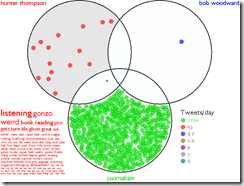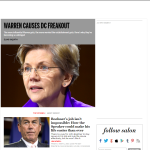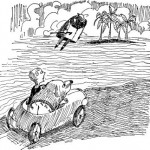In which I don't bother to asssign a subtitle.

Image by Getty Images via Daylife
This past weekend we had a great discussion in the #collegejourn chat about the future of journalism. Starting off talking about the recent congressional hearing, we quickly moved towards the subject of how newspapers should work on the web or in print.
I feel like that discussion, regarding the future of journalism is being mirrored all over, not just in Congress but in many college media groups as well. Unsurprisingly, I brought up some of the same points in tonight’s discussion that I have talking about where GMU’s Office of Student Media should go.
I always feel a bit unbalanced in these discussions. Though I’m passionate about what I think is wrong with journalism and newspapers, and how to fix it. I’m not sure that I’m actually a journalist. I sort of fell into journalism by virtue of being a good copy editor and simply ended up in Student Media. I didn’t come into college interested in being a journalist and, though it may end up that way, I don’t really have the goal of living as a journalist either. Journalism is fascinating and important but I have a completely different perspective that landed me here.
My specialty is interactive narrative. I got involved in journalism at GMU because it seemed like the Office of Student Media was one of the best ways to build my narrative side. That being said, my aim is really to work in the video game industry.
Even though I’ve written a lot of journalistic stories and blogged for a real news organization, I sometimes feel a bit like a faker. For the last year or so, even when working as the student newspaper’s managing editor, my gut reaction is to say: ‘Hey, I’m just a blogger, I’m complimented and all, but shouldn’t you talk to someone who’s an actual student journalist?’
I’ve had the same reaction more than once (including an apparent Freudian slip while writing this post) and it is only within the last few months that I’ve started to think of what I do for the Office of Student Media as something that might possibly be journalism and not just a weird way to do what I love, which is create interactive media. I’ve been extremely lucky because working in Student Media at GMU is the best experience in that regard I could have possibly had. However, it is still hard to think of myself as a journalist.
Now, I’m embroiled in the discussion about the future of journalism all the time, but I always feel a little bad. Because of my perspective, where I’ve come from and where I’m going, I’m either hobbled or freed in these conversations.
It can sometimes feel that, because I’m not necessarily a journalist at heart, I’m released from some core beliefs. I don’t believe that people can be impartial about anything and I don’t think that good journalism has to come without bias. Twice in the last week, when I was arguing about the future of the media, hard-core journalists responded “What about the Journalism?”
Either I’m horribly unethical or thinking outside the box with the idea of good journalism rising from a good platform. I’m not entirely sure yet.
In the discussion last week someone separated us out into Web People and Print People. Another participant noted that as being simplistic, but in retrospect, I think it wasn’t necessarily wrong.
This isn’t to say that the other side doesn’t get it, that print people can’t comprehend the idea of web journalism or be good journalists online (or that web people write bad stories). It just means that they have a different set of priorities then I do. One group is not better or worse than the other.
 I think there are are some people who have come into this wanting to be web people and some who come in wanting to see their name in print. I’d bet that those other web people, like me, prefer Hunter Thomson to Bob Woodward, think that citizens can be journalists, and believe there is no difference between a Journalist and everyone else. We don’t care who is displaying our content, we care who is discussing it.
I think there are are some people who have come into this wanting to be web people and some who come in wanting to see their name in print. I’d bet that those other web people, like me, prefer Hunter Thomson to Bob Woodward, think that citizens can be journalists, and believe there is no difference between a Journalist and everyone else. We don’t care who is displaying our content, we care who is discussing it.
I think for print people it is more about the depth of their investigation, the breadth of their reporting, and the size of their word count. That sort of attitude is good, important and essential. Their satisfaction comes from a byline and from the knowledge that they did a good job. Which is not a bad thing at all.
Both sides need to exist. If we have either one without the other, I’m pretty sure everyone would be screwed. However, I think the web people are going to win out in the end, not because of the economy, but because for us, it’s more about empowering the people than anything else.









![Reblog this post [with Zemanta]](https://img.zemanta.com/reblog_e.png?x-id=0164595f-9f5f-4765-bcf7-d83406f100aa)




















A very good piece. What i find particularly interesting is that the basic questions being addressed here apply to both the journalism and analytical market – both have migrated from a “print” background where research (massive legwork) was paramount. And both have been faced with the issues of the Internet, online publishing and the massive proliferation of “news/commentary” blogs.
– Fred McClimans
[…] do so) and trying to do so is ethically questionable.My stance supporting transparency has long been on the record. That said, the greater my experience, the more I see that transparency […]